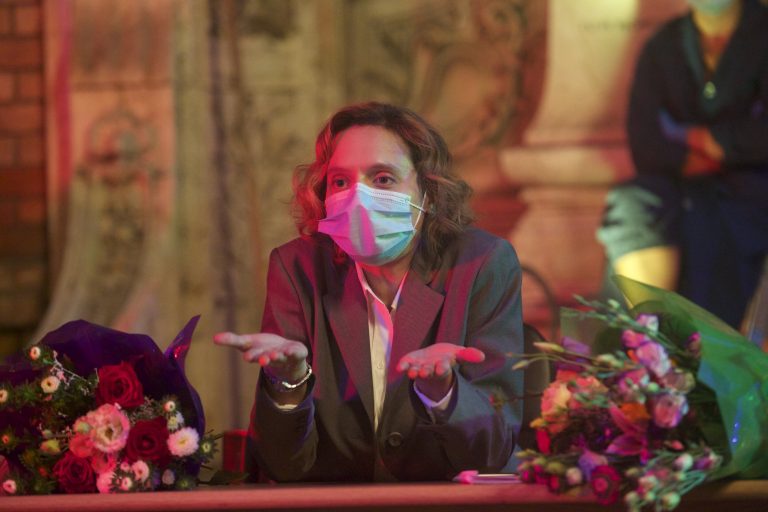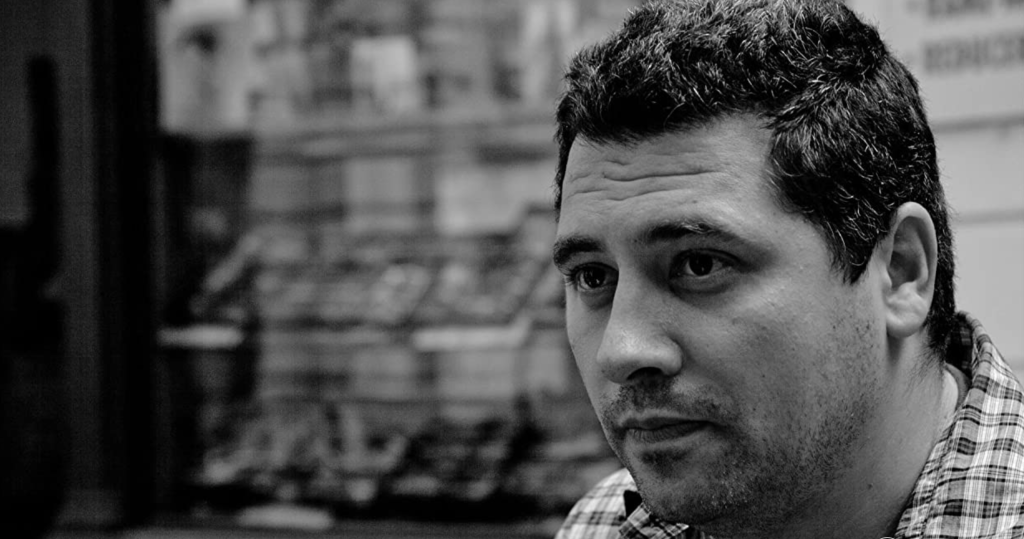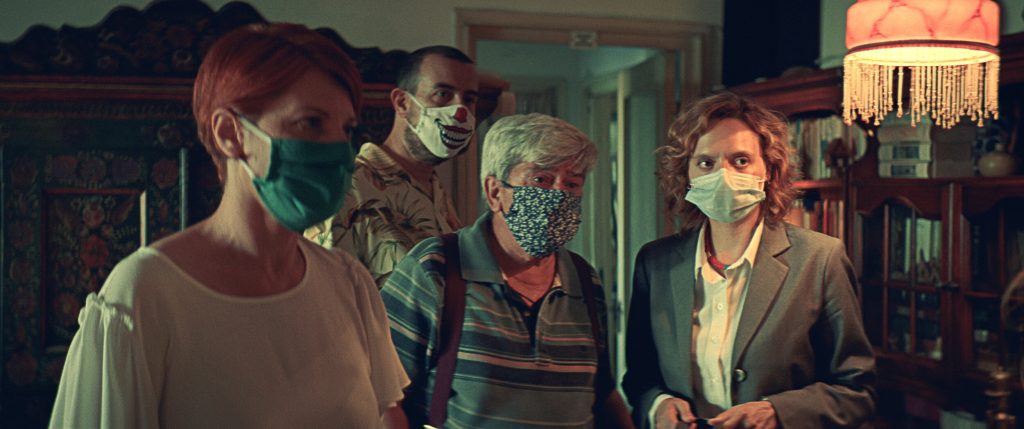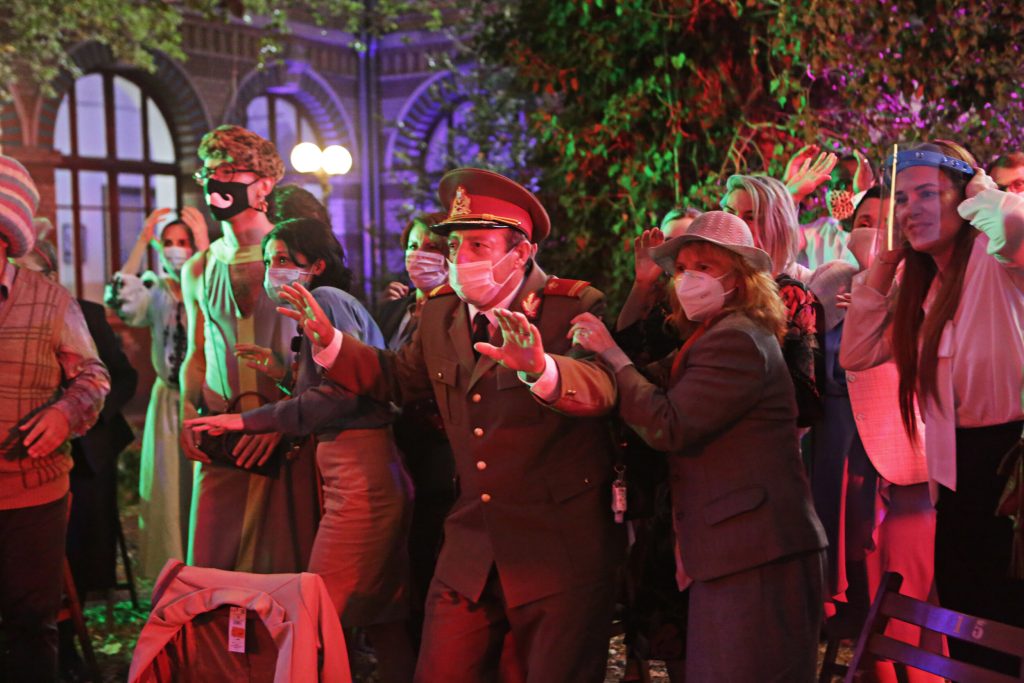
Synopsis : Emi, a schoolteacher, finds her reputation under threat after a personal sex tape is uploaded onto the internet. Forced to meet the parents demanding her dismissal, Emi refuses to surrender. BAD LUCK BANGING OR LOONY PORN is a film in three loosely connected parts: a walk in the city of Bucharest, then a playful essay on obscenities, all culminating, in the third part, in an incendiary comic confrontation.

An Exclusive Interview with Director Radu Jude
Q: You’ve tackled some interesting subject matter through your films “Scarred Hearts” and “Uppercase Print.” How did this movie come about and what was the motivation behind it?
Radu Jude: What’s the motivation? It’s always a complicated thing to answer [as to] why. I thought it’s a good story about contemporary life and society in Romania. Now that we are living in a digital world, I also thought it would be a good story about the interaction between our rights to our body and our public obligations and societal pressure.
Q: People have been talking about toxic masculinity ever since the #MeToo Movement kicked in. What do you think about the perception of toxic masculinity in the Romanian film industry?
Radu Jude: I’m not sure I’m the best person to answer your question. First of all, the good thing is that more and more women are making films in Romania as there’s more female filmmakers. The Romanian film industry is so small. You mentioned the #MeToo Movement — that goes for a big film industry like in the U.S, with powerful producers, distributors, filmmakers, whatever, but we don’t have that in Romania, where our country produces 10, maybe sometimes 15 feature films a year, maximum. This is not a real film industry. But, it’s important to have more female voices. And I think that there’s a lot of women making films nowadays. I hope there will be more in the future.
Q: What was the process of casting Katia who plays Emi (Emilia), a lead character in your film. She was acting in a stage play. Did she go through an audition or did you like her performance in the play?
Radu Jude: I didn’t have any auditions for her, because I had almost cast her for a previous film. I liked her for other films that I made. So with this film, I knew from the beginning, I wanted her to be in my film. I just gave her the script and she said, “Yes,” and that was it. Our process was easy to do because she’s extremely serious and hard working. She did a lot of plays that dealt with political issues in the independent theater. She’s very hard-working and easy to work, which is great. Our discussions were like, ‘let’s do a film’ and that was it. We did some rehearsal and then we shot the film.

Q: There are sexually explicit scenes in the film. How did you get her to perform the way you wanted, and also thought-provoking at the same time as the director?
Radu Jude: You mentioned how difficult this kind of thing is. I think cinema is a privileged profession in a way, so it’s not that difficult to do. Of course, some decisions are more difficult than the others. In this case, I think the nature of the film was to mix things up. This was a very mixed-up film, because of the eyebrow-raising topics [it addresses] and its low-brow humor. Yeah, everything is put together here like in a melting pot. So it wasn’t difficult. At some point you have to decide what to keep in the film or not. I just did it on the basis of my intuition and that’s the result — whether you like it or not.
Q: Do you think that Romanian culture was seriously affected by the Romanian military and the oppression against it by the late Nicolae Ceaușescu’s administration?
Radu Jude: Of course. Our history has deeply clashed with our culture today. If you look at the Black Lives Matter [movement] in the United States, — when did it start? It started with the slavery. So it’s not like something that happened years ago or hundreds of years ago doesn’t have consequences today. In the case of Romania, yes, its communist past has a certain influence — some of it positive, some negative. Romanian Fascism is still present, with many of its ideas still around. We also have the capitalist past of the last 30 years. Also individualism and neoliberalism are destroying the country and poisoning our lives in different ways than it was with the communists; but it’s still there. I think all of these things come together in my film.
Q : It’s fascinating that your three-structure concepts of the one in the middle shows a history and perspective of Romania is very innovative. How did you come up with the concept? What was your intention behind it?
Radu Jude: As I said, it’s written there, the sketch for the popular fields. So the idea was to structure it in such a way that asks the viewers to make their own associations and connections, not only those of the filmmakers. I don’t know how it is in the United States, but in Romania we have a Pizza Hut. If you have a salad bar, you have everything on a table and there’s food like tomatoes, cucumbers, corn, mustard and mayonnaise. And you make the salad yourself, right? So I think the film is like a Pizza Hut salad bar with all the elements there. The viewer has to choose and put them in order to create the connections, like the salad, is the film.

Q: It’s fascinating that you did three endings to the story. Obviously, you let the audience decide what this film is about — and you let the audience enjoy the film. Because you present this as a key point of this film, could you explain your reference to Isaac Babel’s book?
Radu Jude: A lot of the film’s texts are literary or philosophical quotations. And Isaac Babel is just one among the others. All of these quotations that I collected are according to my taste and vision of the film, for the topic of the film. It’s nothing more than my intuition that made me choose them. Another filmmaker might have had the same idea, but that’s also personal and intuitive.
Q: There’s all of these talented Romanian directors out there: Cristi Puiu, Cristian Mungiu, Corneliu Porumboiu. What’s your view about the Romanian film industry right now?
Radu Jude : Well, it’s difficult for me to speak about that because it’s not an easy thing to say. What I can say is that, it’s always on the edge of losing financing, and I think it’s also risking becoming too stiff. I think more diversity, the films of women are more diverse than the films of men. It will take us one day to speak about Romania for me to see which doesn’t really exist.
As I said, there’s too many directors, but too few films. I would like Romania to have a film industry, but I think there’s no potential for that, it just doesn’t happen. Because cinema is related to all branches of society with politics, economics, the justice system, and everything else involved. If these don’t work well, the cinema doesn’t work as well.
Q: You just won the Berlin Film Festival — do you ever think about working in other countries if it was offered to you?
Radu Jude: I have an agent who sent me a script from the United States. I said yes, but it never happened. I’ll take the offer if I like it.
Here’s the trailer of the film.
Releases November 19, 2021

